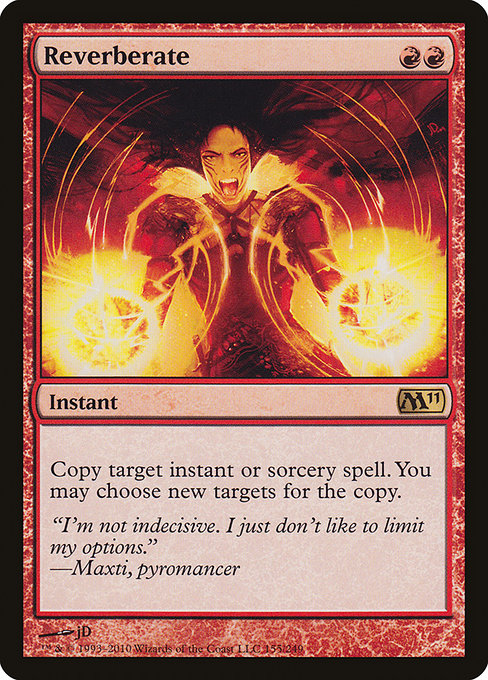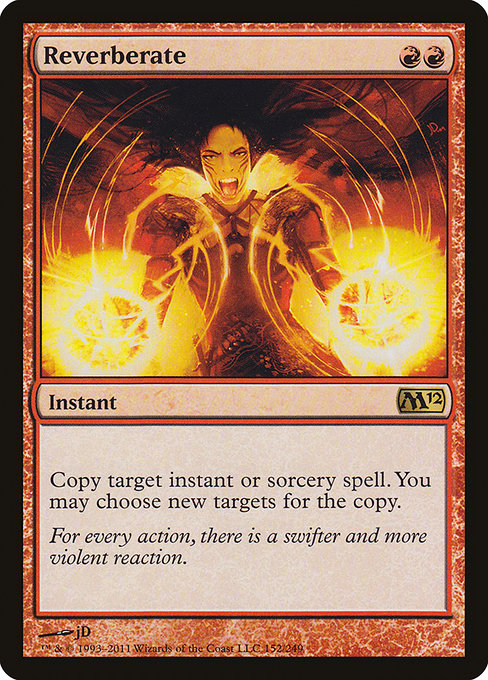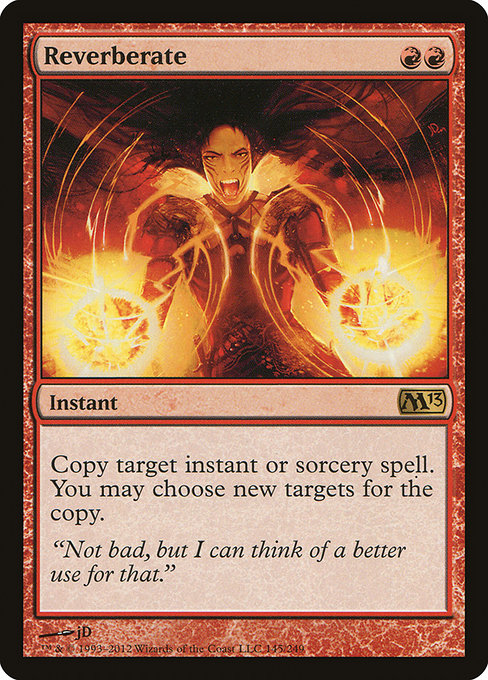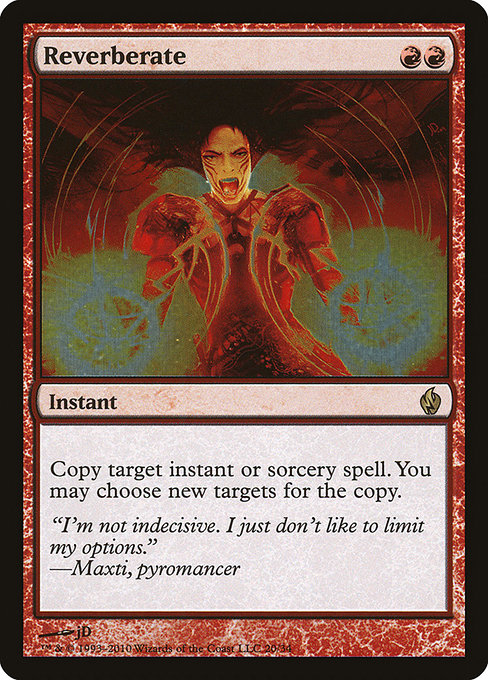standard
future
historic
gladiator
pioneer
explorer
modern
legacy
pauper
vintage
penny
commander
brawl
alchemy
paupercommander
duel
oldschool
premodern
Rulings
If the spell Reverberate copies has an X whose value was determined as it was cast (like Earthquake does), the copy has the same value of X.
The copy will have the same targets as the spell it’s copying unless you choose new ones. You may change any number of the targets, including all of them or none of them. If, for one of the targets, you can’t choose a new legal target, then it remains unchanged (even if the current target is illegal).
You can’t choose to pay any additional costs for the copy. However, effects based on any additional costs that were paid for the original spell are copied as though those same costs were paid for the copy too. For example, if a player sacrifices a 3/3 creature to cast Fling, and you copy it with Reverberate, the copy of Fling will also deal 3 damage to its target.
When Reverberate resolves, it creates a copy of a spell. You control the copy. That copy is created on the stack, so it’s not “cast.” Abilities that trigger when a player casts a spell won’t trigger. The copy will then resolve like a normal spell, after players get a chance to cast spells and activate abilities.
If the copy says that it affects “you,” it affects the controller of the copy, not the controller of the original spell. Similarly, if the copy says that it affects an “opponent,” it affects an opponent of the copy’s controller, not an opponent of the original spell’s controller.
Reverberate can target (and copy) any instant or sorcery spell, not just one with targets. It doesn’t matter who controls it.
If the spell Reverberate copies is modal (that is, it says “Choose one —” or the like), the copy will have the same mode. You can’t choose a different one.
The copy will have the same targets as the spell it’s copying unless you choose new ones. You may change any number of the targets, including all of them or none of them. If, for one of the targets, you can’t choose a new legal target, then it remains unchanged (even if the current target is illegal).
You can’t choose to pay any additional costs for the copy. However, effects based on any additional costs that were paid for the original spell are copied as though those same costs were paid for the copy too. For example, if a player sacrifices a 3/3 creature to cast Fling, and you copy it with Reverberate, the copy of Fling will also deal 3 damage to its target.
When Reverberate resolves, it creates a copy of a spell. You control the copy. That copy is created on the stack, so it’s not “cast.” Abilities that trigger when a player casts a spell won’t trigger. The copy will then resolve like a normal spell, after players get a chance to cast spells and activate abilities.
If the copy says that it affects “you,” it affects the controller of the copy, not the controller of the original spell. Similarly, if the copy says that it affects an “opponent,” it affects an opponent of the copy’s controller, not an opponent of the original spell’s controller.
Reverberate can target (and copy) any instant or sorcery spell, not just one with targets. It doesn’t matter who controls it.
If the spell Reverberate copies is modal (that is, it says “Choose one —” or the like), the copy will have the same mode. You can’t choose a different one.
Rulings
If the spell Reverberate copies has an X whose value was determined as it was cast (like Earthquake does), the copy has the same value of X.
The copy will have the same targets as the spell it’s copying unless you choose new ones. You may change any number of the targets, including all of them or none of them. If, for one of the targets, you can’t choose a new legal target, then it remains unchanged (even if the current target is illegal).
You can’t choose to pay any additional costs for the copy. However, effects based on any additional costs that were paid for the original spell are copied as though those same costs were paid for the copy too. For example, if a player sacrifices a 3/3 creature to cast Fling, and you copy it with Reverberate, the copy of Fling will also deal 3 damage to its target.
When Reverberate resolves, it creates a copy of a spell. You control the copy. That copy is created on the stack, so it’s not “cast.” Abilities that trigger when a player casts a spell won’t trigger. The copy will then resolve like a normal spell, after players get a chance to cast spells and activate abilities.
If the copy says that it affects “you,” it affects the controller of the copy, not the controller of the original spell. Similarly, if the copy says that it affects an “opponent,” it affects an opponent of the copy’s controller, not an opponent of the original spell’s controller.
Reverberate can target (and copy) any instant or sorcery spell, not just one with targets. It doesn’t matter who controls it.
If the spell Reverberate copies is modal (that is, it says “Choose one —” or the like), the copy will have the same mode. You can’t choose a different one.
The copy will have the same targets as the spell it’s copying unless you choose new ones. You may change any number of the targets, including all of them or none of them. If, for one of the targets, you can’t choose a new legal target, then it remains unchanged (even if the current target is illegal).
You can’t choose to pay any additional costs for the copy. However, effects based on any additional costs that were paid for the original spell are copied as though those same costs were paid for the copy too. For example, if a player sacrifices a 3/3 creature to cast Fling, and you copy it with Reverberate, the copy of Fling will also deal 3 damage to its target.
When Reverberate resolves, it creates a copy of a spell. You control the copy. That copy is created on the stack, so it’s not “cast.” Abilities that trigger when a player casts a spell won’t trigger. The copy will then resolve like a normal spell, after players get a chance to cast spells and activate abilities.
If the copy says that it affects “you,” it affects the controller of the copy, not the controller of the original spell. Similarly, if the copy says that it affects an “opponent,” it affects an opponent of the copy’s controller, not an opponent of the original spell’s controller.
Reverberate can target (and copy) any instant or sorcery spell, not just one with targets. It doesn’t matter who controls it.
If the spell Reverberate copies is modal (that is, it says “Choose one —” or the like), the copy will have the same mode. You can’t choose a different one.
Votre collection ? vos decks ?
Envie de gérer votre collection et/ou créer des decks ?
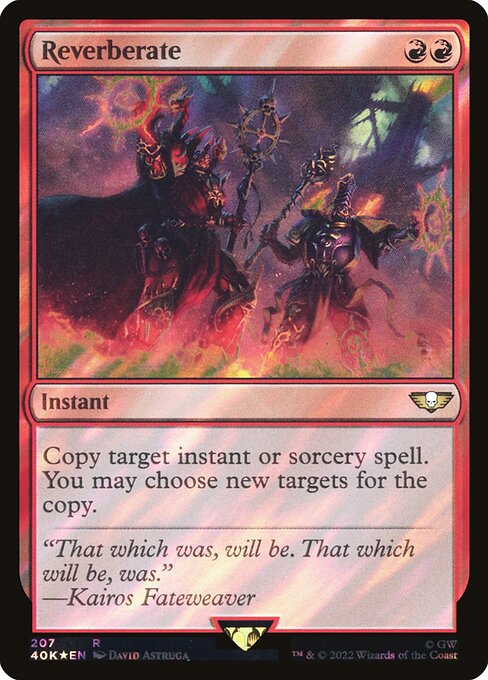

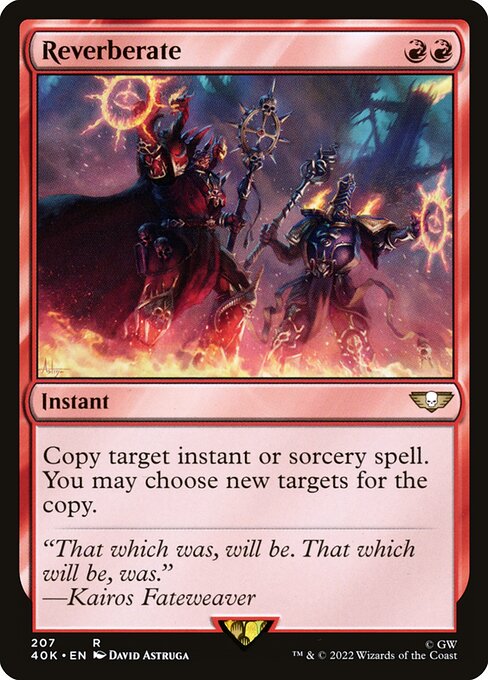
 0
0
 1.31€
1.31€
